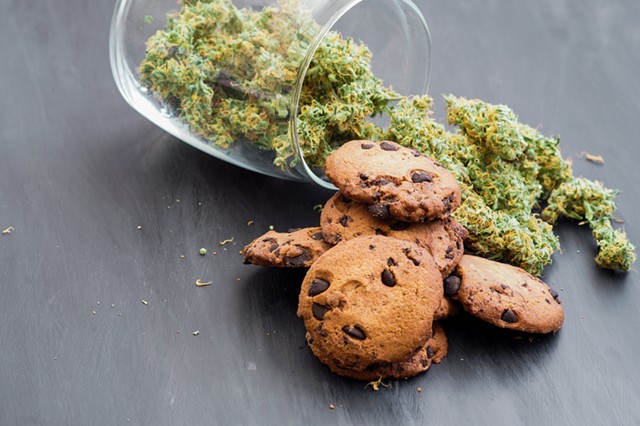Introduction
Cannabidiol (CBD) has gained significant attention for its potential health benefits, including pain relief, reducing anxiety, and aiding sleep. Unlike THC (tetrahydrocannabinol), the psychoactive component in cannabis, CBD doesn’t cause a ‘high.’ A common question among users and researchers is whether CBD stimulates appetite, leading to the feeling of hunger. This article will explore the current scientific understanding of CBD’s effects on appetite.

Understanding CBD and the Endocannabinoid System
The human body contains an endocannabinoid system (ECS), which plays a vital role in regulating various functions, including mood, pain sensation, and appetite. CBD interacts with this system, but its effects differ significantly from THC. THC binds directly to CB1 receptors in the brain, known to stimulate appetite. CBD, however, doesn’t bind directly to these receptors and thus has a different influence on the body’s physiological processes.
Scientific Research on CBD and Appetite
Several studies have investigated CBD’s impact on appetite. A 2012 study observed that CBD appeared to suppress appetite in rats. Another research study in 2018 noted that while THC could increase the appetite, CBD did not show a significant impact on hunger. However, the research in this area is still evolving, and many studies are based on animal models, meaning that the results may not directly translate to humans.
Anecdotal Evidence and User Reports
Despite limited scientific evidence, anecdotal reports from CBD users vary. Some report experiencing increased hunger, while others notice no change or even a decreased appetite. This variation could be due to individual differences in metabolism, the endocannabinoid system, or even the placebo effect.
The Impact of Full-Spectrum CBD vs. CBD Isolate
It’s important to differentiate between full-spectrum CBD, which contains a range of cannabinoids including trace amounts of THC, and CBD isolate, which is purely cannabidiol. The presence of other cannabinoids in full-spectrum CBD might influence its overall effect on appetite, potentially leading to different experiences compared to CBD isolate.
The Role of Terpenes and Flavonoids
Besides cannabinoids, hemp-derived CBD products contain terpenes and flavonoids, compounds that contribute to the plant’s aroma and flavor, and might also affect appetite. Some terpenes are believed to help suppress appetite, while others might do the opposite.
CBD, Metabolism, and Digestive Health
CBD’s interaction with the ECS also implicates its potential role in metabolism and digestive health. While not directly stimulating hunger, CBD may influence gut health and digestion, potentially affecting feelings of fullness and appetite indirectly.
Interplay Between CBD and Mental Health
The relationship between CBD and mental health also warrants attention. Mental health conditions like anxiety and depression can significantly affect appetite and eating patterns. CBD’s potential to alleviate symptoms of anxiety and depression might indirectly influence appetite regulation. For instance, reduced anxiety levels may normalize eating patterns in individuals who eat less under stress. Conversely, those who experience increased appetite as a stress response might find more balance with CBD use. Thus, the impact of CBD on mental health could be a critical factor in understanding its overall effect on hunger and eating habits.
Comparison with Traditional Appetite Stimulants
Traditional appetite stimulants, such as certain medications and dietary supplements, often work by directly affecting hunger hormones or brain regions responsible for appetite. CBD, however, does not function as a direct stimulant. Its potential impact on appetite is more subtle and indirect, primarily through its interactions with the ECS and possibly through improvements in overall well-being and digestive health.
Personalized Effects and Dosage Considerations
The effects of CBD on appetite may also depend on dosage, delivery method, and individual physiological differences. Higher doses of CBD might have different impacts compared to lower doses. For example, a small dose might have minimal effect on appetite, while a higher dose could potentially influence digestive processes or stress responses more significantly, thereby indirectly affecting hunger. Additionally, the method of consumption (e.g., oral, sublingual, inhalation) can influence how quickly and strongly CBD acts, further contributing to its variable effects on different individuals.
The Future of Research and Implications
Future research is essential to fully understand CBD’s impact on appetite and hunger. Long-term studies involving human subjects are particularly needed to validate the findings observed in animal models and anecdotal reports. Such research will not only clarify CBD’s potential role in appetite regulation but also help in formulating guidelines for its use as a therapeutic agent in conditions affecting appetite and digestion. Understanding the nuances of how CBD interacts with the body’s natural systems could lead to more targeted and effective uses of this compound in managing appetite and digestive health.
Conclusion
In conclusion, while THC is known for its appetite-stimulating effects, the evidence suggests that CBD does not typically induce hunger. However, individual experiences with CBD can vary, and the compound might indirectly influence appetite through its effects on digestion and overall well-being. As research continues to evolve, a clearer understanding of CBD’s impact on hunger and metabolism is expected to emerge.
